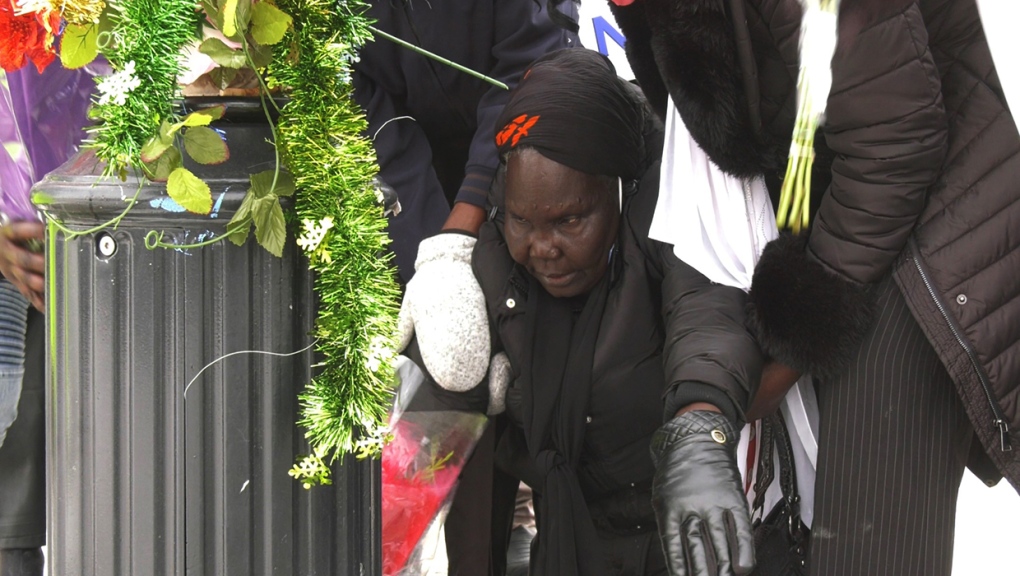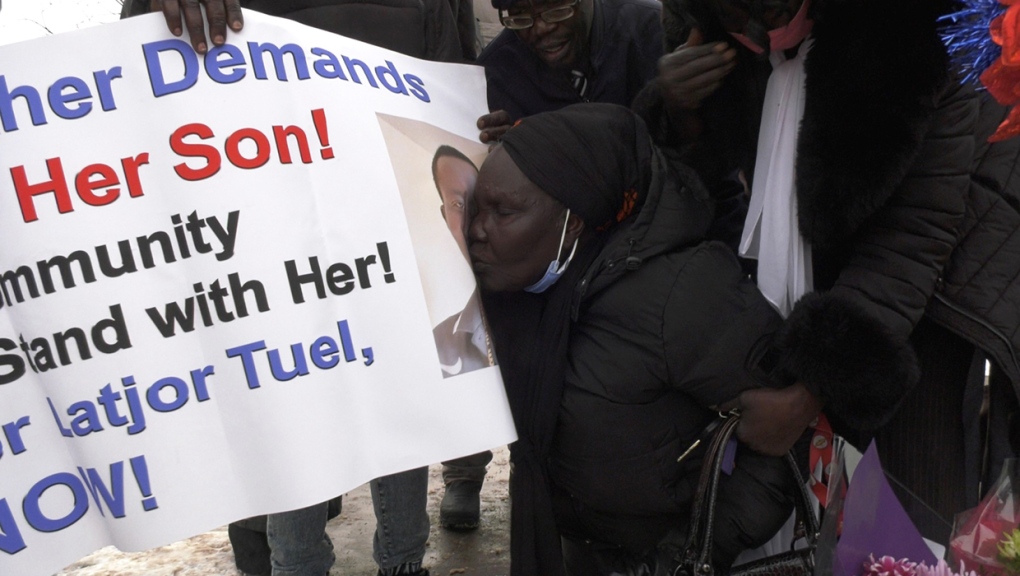Mother of Calgary man killed by police calls for justice
The mother of a Calgary man shot and killed by police earlier this year arrived in the city from Sudan on Saturday as calls for justice grow louder.
Latjor Tuel, 41, was shot by Calgary police on Feb. 19in the 4500 block of 17 Avenue S.E. after officers responded to a weapons complaint.
“Latjor was in need of help, not a bullet to his head or his chest,” said Tuel’s mother Rebecca Aker Akol who laid flowers at the scene of where her son was shot.
Tuel was a child soldier who grew up in Sudan and moved to Calgary in 2000 to start a better life for himself.
Akol had not seen her son for nearly two decades but knew he suffered from post-traumatic stress disorder and never imagined their final visit would eventually take place at a Calgary cemetery.
“My children need this closure, I want to touch his grave, I want to touch his body, I came to seek accountability,” she said.
“I demand justice for Latjor. I want to know who killed him. I want to know why.”
 Tuel was a child soldier who grew up in Sudan and moved to Calgary in 2000 to start a better life for himself.
Tuel was a child soldier who grew up in Sudan and moved to Calgary in 2000 to start a better life for himself.
According to investigators, Tuel was carrying a knife and holding a stick during the incident that led to his death. Video of the incident shows Tuel surrounded by several officers as he sat on the sidewalk and was repeatedly asked to drop his weapon.
Police say non-lethal weapons were used, but efforts to reach peaceful negotiations led to officers firing their guns as Tuel approached and stabbed a police dog.
Tuel was reportedly shot four times by two officers. He died at the scene where his body remained for several hours as officers contained the scene. No police officers were injured and the police dog was taken to an animal hospital in life-threatening condition.
“Latjor was the one who took care of us, he was like a father to us. This is so hard for us to see our mother at a time like this, it’s very hard emotionally and physically,” said Tuel’s sister, Themar Kuly Tuel.
“Justice is for all of us, everybody should be accountable, justice for Latjor. If justice is served, we will at least have closure.”
ASIRT INVESTIGATION ONGOING
CTV News reached out to the Alberta Serious Incident Response Team which is continuing to investigate the incident.
The police watchdog for the province is calling on witnesses to come forward with any additional information, but when asked for an update on the investigation, nothing was made available.
CTV asked for a timeline on how long the investigation will take and no definitive answer could be given.
Calgary police previously said they responded to an assault call regarding Tuel and not a report about mental health.
"This situation involved a person, armed with weapons, who had committed an assault," said Chief Mark Neufeld earlier this year.
"This was a police call and police were the appropriate resource."
CALGARY SUDANESE COMMUNITY CALLS FOR ANSWERS
Khor Top, the president of the Calgary South Sudanese Community, says more mental health resources should have been dispatched prior to Tuel’s death.
“He was struggling, he didn’t need a bullet, he needed counselling, trauma treatment, and medical treatment,” Top said.
 Akol had not seen her son for nearly two decades but knew he suffered from post-traumatic stress disorder and never imagined their final visit would eventually take place at a Calgary cemetery.
Akol had not seen her son for nearly two decades but knew he suffered from post-traumatic stress disorder and never imagined their final visit would eventually take place at a Calgary cemetery.
“Justice now means holding people accountable and having a fair way of doing things instead of police being just the safeguard of the communities. If there is any issue in the future for somebody who's struggling, justice means calling on those that can help somebody or get them to hospital.”
Top adds that rebuilding the relationship between Calgary police and the local Sudanese community is about a willingness to increase safety.
“So, if the police are willing to build the relationship and the trust with the community, I think it's not it’s not difficult,” he said.
“It just takes willingness to work together as a community and to be there for the community members for the safety of all. Building that relationship is paramount.”
Charles Odame-Ankrah with the Calgary African Community Collective also weighed in on the issue and called on police to implement better de-escalation skills.
“Latjor didn’t have a gun, he had a stick and a knife. He was just looking for help. He was going through mental stress. That's how tragic it was,” said Odame Ankrah.
“Wrong has no colour and we want to stress that whether you or Caucasian, Black, Caribbean or any race, it doesn’t matter and we need to call this what it is.”
CTVNews.ca Top Stories

DEVELOPING Man sets self on fire outside New York court where Trump trial underway
A man set himself on fire on Friday outside the New York courthouse where Donald Trump's historic hush-money trial was taking place as jury selection wrapped up, but officials said he did not appear to have been targeting Trump.
BREAKING Sask. father found guilty of withholding daughter to prevent her from getting COVID-19 vaccine
Michael Gordon Jackson, a Saskatchewan man accused of abducting his daughter to prevent her from getting a COVID-19 vaccine, has been found guilty for contravention of a custody order.
She set out to find a husband in a year. Then she matched with a guy on a dating app on the other side of the world
Scottish comedian Samantha Hannah was working on a comedy show about finding a husband when Toby Hunter came into her life. What happened next surprised them both.
Mandisa, Grammy award-winning 'American Idol' alum, dead at 47
Soulful gospel artist Mandisa, a Grammy-winning singer who got her start as a contestant on 'American Idol' in 2006, has died, according to a statement on her verified social media. She was 47.
'It could be catastrophic': Woman says natural supplement contained hidden painkiller drug
A Manitoba woman thought she found a miracle natural supplement, but said a hidden ingredient wreaked havoc on her health.
Young people 'tortured' if stolen vehicle operations fail, Montreal police tell MPs
One day after a Montreal police officer fired gunshots at a suspect in a stolen vehicle, senior officers were telling parliamentarians that organized crime groups are recruiting people as young as 15 in the city to steal cars so that they can be shipped overseas.
The Body Shop Canada explores sale as demand outpaces inventory: court filing
The Body Shop Canada is exploring a sale as it struggles to get its hands on enough inventory to keep up with "robust" sales after announcing it would file for creditor protection and close 33 stores.
Vicious attack on a dog ends with charges for northern Ont. suspect
Police in Sault Ste. Marie charged a 22-year-old man with animal cruelty following an attack on a dog Thursday morning.
On federal budget, Macklem says 'fiscal track has not changed significantly'
Bank of Canada governor Tiff Macklem says Canada's fiscal position has 'not changed significantly' following the release of the federal government's budget.































